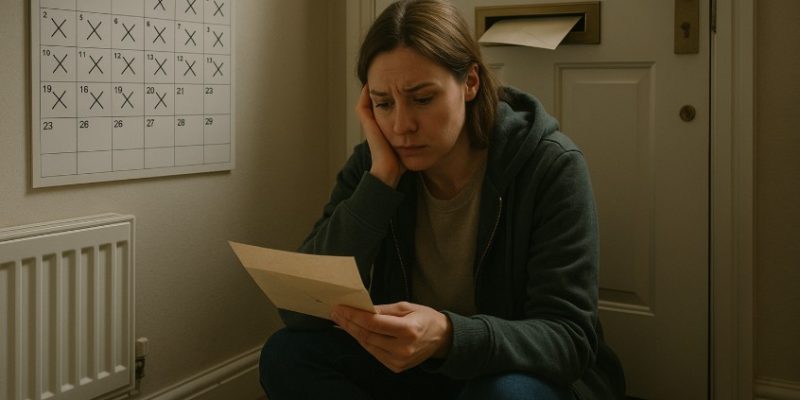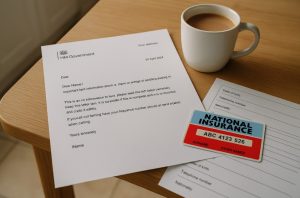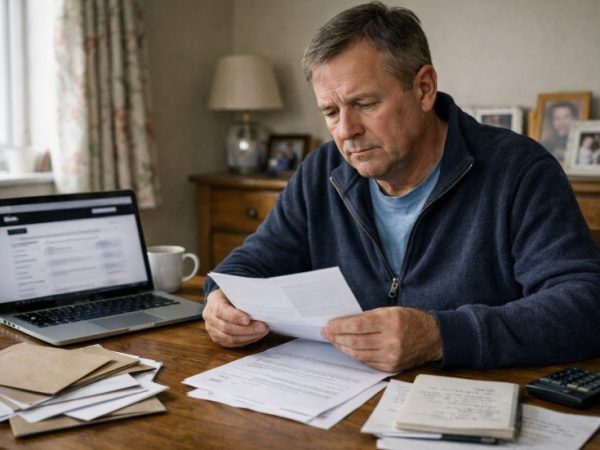
How Long to Wait for PIP Award Letter and What to Do If It Hasn’t Arrived?
The Personal Independence Payment (PIP) process can be a long and uncertain journey. For many, the period between the assessment and the arrival of the award letter is filled with anxiety and questions.
The award letter not only confirms whether a claim has been successful but also outlines the level of support the claimant is entitled to.
Understanding how long to wait for a PIP award letter, and what steps to take if it doesn’t arrive, is essential for navigating this process with confidence.
What Is A PIP Award Letter And Why Is It Important?

A Personal Independence Payment (PIP) award letter is the official document issued by the Department for Work and Pensions (DWP) to inform a claimant of the outcome of their Personal Independence Payment application.
This letter is essential because it serves as legal confirmation of a person’s entitlement to PIP and outlines all the critical information related to the benefit.
The letter includes:
- The type and rate of PIP awarded (daily living, mobility, or both)
- The duration of the award
- The date from which payments will begin
- A breakdown of how the decision was reached
- Information on how to challenge the decision, if necessary
Many other benefits and services depend on receiving this letter. For example, it may be required as proof for applying for a Blue Badge, vehicle tax exemption, or additional support through housing benefits. Without it, a claimant may face delays in accessing these services.
How Long Does It Usually Take To Receive A PIP Award Letter After Assessment?
On average, the DWP sends the award letter within one to two weeks after the decision has been made.
Claimants typically receive a text message confirming that a decision has been reached, and the letter is usually dispatched shortly afterwards.
The timeline from the start of the PIP application process to receiving the award letter is longer.
For new claims, the full process can take up to 20 weeks, although this varies depending on individual circumstances.
Below is a table summarising the average timeframes for each stage of the PIP process:
| Stage Of Claim | Estimated Timeframe | Notes |
| Initial Application Processing | 2 to 4 weeks | Depends on DWP backlog |
| Assessment Appointment | 4 to 8 weeks after application | Scheduled by a third-party provider |
| Decision Making | 4 to 8 weeks post-assessment | May be quicker if no further evidence is required |
| Award Letter Delivery | 1 to 2 weeks post-decision | Sent via Royal Mail; may vary by location |
It is important to remember that this timeline can shift based on broader demand, staffing, and how complex the claim is.
What Factors Can Affect The Waiting Time For A PIP Decision Letter?
Several elements can extend or shorten the time it takes to receive a PIP award letter. These factors often go unnoticed but can significantly impact the waiting period.
- Volume of Claims: A surge in new applications or reviews can slow down the system. The DWP handles hundreds of thousands of PIP claims annually, and processing resources are limited.
- Complexity of the Case: Claims involving multiple or less straightforward medical conditions often require additional evidence or specialist input. These may be reviewed by senior case managers, extending the decision process.
- Type of Claim: New claims might be processed faster than reviews of existing awards. This is often due to the need to reassess previous information and compare it with new evidence.
- Medical Evidence: Incomplete or conflicting medical documentation can cause delays while assessors seek clarification.
- DWP Internal Processes: Seasonal staff shortages, postal delays, or IT system issues within the DWP can also contribute to longer wait times.
Here is a table outlining common causes of delay and what claimants can do in each case:
| Reason For Delay | Explanation | Recommended Action |
| High Claim Volume | Surge in applications or staff shortages | Allow additional time, monitor texts |
| Complex Medical Condition | Needs specialist review or more evidence | Ensure all evidence is submitted early |
| Missing Documentation | Incomplete or unclear medical records | Contact GP or specialist to provide further info |
| Address Errors | Letter sent to outdated or wrong address | Confirm address with DWP |
| Postal Disruption | Royal Mail delays in some regions | Wait a few more days before contacting DWP |
By understanding what may be causing a delay, claimants can better manage their expectations and take proactive steps if necessary.
What Should Someone Do If The PIP Award Letter Hasn’t Arrived Yet?

Waiting for a PIP award letter after receiving a decision notification can be an anxious experience.
While most claimants receive their letter within one to two weeks after a decision has been made, delays can and do occur.
If the award letter hasn’t arrived within a reasonable timeframe, it’s important to know what steps to take to avoid further disruption or confusion.
Step 1: Check the Decision Notification Date
The DWP typically sends a text message to inform you that a decision has been made regarding your PIP claim. This message marks the beginning of the countdown to when the award letter should arrive.
From this point, the DWP advises claimants to allow up to two weeks for the letter to be delivered via Royal Mail.
If you’re unsure of the date the message was received, review your phone’s message history and take note of the exact day. This will help you calculate whether the expected delivery window has passed.
Step 2: Review Your Post Regularly
Though it may seem obvious, make sure to check your post every day, especially if you live in a household with others or in shared accommodation. Sometimes letters may be:
- Placed in communal areas or letter racks
- Misdelivered to neighbours
- Temporarily held at your local Royal Mail delivery office if access was not possible
If you suspect the letter could have been lost or misdelivered, you can also speak to neighbours or contact Royal Mail directly to see if a delivery was attempted.
Step 3: Confirm Your Address With The DWP
One of the most common causes of undelivered award letters is an outdated or incorrect address on file.
If you’ve moved recently or changed your living situation, and you didn’t inform the DWP, the letter may have gone to your previous address.
To verify your address on record:
- Prepare your National Insurance number, full name, and date of birth
- Call the DWP enquiry line after the 14-day waiting period
- Ask the agent to confirm which address your letter was sent to
If the address is incorrect, you can update it and request the letter to be resent to your current address.
Step 4: Avoid Calling Too Early
It’s understandable to want quick answers, but the DWP has a structured process in place.
Calling before the recommended two-week period has passed may result in being advised to continue waiting, as the letter is still considered in transit.
The DWP does not typically provide the outcome of a claim over the phone unless the letter has already been issued and time has passed for it to arrive.
They rely on postal delivery for official notification, and call centre staff are not always authorised to discuss full award details before that point.
Step 5: Contact The DWP After Two Weeks
If 14 calendar days have passed since you received the decision text and you still haven’t received your award letter, it’s time to call the DWP to investigate. Use the PIP enquiry line:
- Telephone: 0800 121 4433
- Textphone: 0800 121 4493
- Relay UK: 18001 then 0800 121 4433
Be prepared to provide:
- Your full name and address
- Date of birth
- National Insurance number
- The date of your assessment and/or decision text message
The DWP can check the system to confirm if the letter was issued, whether it was returned as undeliverable, and if necessary, arrange for a duplicate copy to be sent.
In some cases, they may be able to provide general decision information over the phone if sufficient time has passed.
Step 6: Document All Communication
It’s a good practice to keep a written record of all communication with the DWP, especially when dealing with a missing award letter.
Note the date and time of your calls, the name of the person you spoke to, and what actions were taken.
This can be helpful if you need to follow up or raise a formal complaint in future.
Having detailed records also helps support your case if delays in receiving the letter affect your ability to access related benefits or appeal the decision within the required timeframe.
Step 7: Consider Requesting Written Confirmation via Email or Post
While DWP primarily communicates decisions via post, in certain situations, especially if a letter has been delayed or lost multiple times, they may agree to provide additional confirmation by post or offer an interim explanation of the decision over the phone.
Although full decision letters are not sent via email for security reasons, confirming basic award details in a follow-up letter can give you peace of mind while waiting for the full document.
How Can Someone Contact The DWP About A Missing PIP Letter?

If it becomes necessary to contact the DWP about a delayed or missing letter, claimants should use official channels.
The best method is by phone, although textphone and Relay UK services are available for those with communication difficulties.
- Phone: 0800 121 4433 (Monday to Friday, 9am to 5pm)
- Textphone: 0800 121 4493
- Relay UK: Dial 18001 then 0800 121 4433
- By Post: Written requests are possible but not recommended for time-sensitive issues
When contacting the DWP, you should be prepared with:
- Your National Insurance number
- Your full name, date of birth, and address
- The date of your last assessment or the date you received the text message confirming the decision
The DWP can confirm if the letter has been sent and will reissue it if necessary. It’s also a good idea to ask for the estimated time for the reissued copy to arrive.
Can Someone Track The Status Of Their PIP Claim Or Award Letter?
Unlike other services, there is currently no online tracking system for PIP claims or the award letter.
However, the DWP does send text message updates at key points in the claim process, including:
- When the application is received
- When the assessment is booked or completed
- When the decision is made
While there’s no way to track the letter’s delivery status, staying aware of these communication points can help claimants understand where they are in the process.
If more than 14 days pass after receiving the decision notification and no letter has arrived, calling the PIP enquiry line is the only viable way to confirm the next steps.
What Are The Options If There’s A Delay In Receiving PIP Payments Too?

Delays in receiving the award letter can directly impact when payments begin. Normally, payments start within 7 to 14 days after the letter has been delivered.
In some cases, the payment is processed earlier, but it won’t reach the claimant until after the award is confirmed in writing.
Claimants who have received their letter but not the payment should:
- Wait up to 14 days before contacting the DWP
- Check their bank account details provided during the application
- Contact the enquiry line with the award letter to verify payment dates
If the letter has not arrived, the DWP will not typically provide payment details until the letter is officially received.
However, once it arrives, the first payment may include backdated amounts from the date the decision was made or from the start of the claim, depending on the specific case.
Conclusion
The PIP process can be lengthy, with several stages that affect the timeline of receiving an award letter.
While most claimants receive their letter within two weeks of the DWP’s decision, it’s not uncommon to wait longer.
Understanding what impacts this wait, and knowing what steps to take if delays occur, helps individuals feel more in control during a potentially stressful period.
Remaining organised, documenting communication, and reaching out when appropriate are key strategies to managing the process effectively.
Frequently Asked Questions
How long does the full PIP process usually take from start to finish?
The entire PIP claim process, from application to receiving the award letter, typically takes around 20 weeks. However, this varies depending on the claim type and DWP’s current processing load.
Can you receive PIP payments before the award letter arrives?
No, payments generally begin only after the award letter is issued. The letter includes payment start dates and amounts.
Is it possible to receive a decision by phone or email instead of a letter?
No, all official decisions are sent by post via an award letter. DWP does not provide PIP decisions over the phone or email.
What should you do if your address changes before the award letter arrives?
You should contact the PIP enquiry line immediately to update your address. This ensures the award letter reaches the correct location.
Can delays in receiving the PIP letter affect other benefits?
Yes, some benefits or services may require proof of your PIP award. Delays in receiving the letter can therefore impact access to additional support.
What happens if the award letter is lost in the post?
You can request a duplicate by contacting the DWP. They will verify your identity and reissue the letter.
How often is a PIP award reviewed?
PIP awards are typically reviewed every 2 to 10 years depending on the condition. The review date is stated in the award letter.





